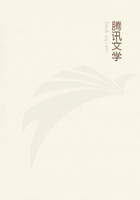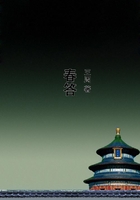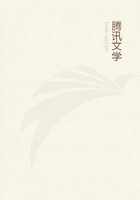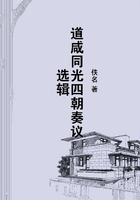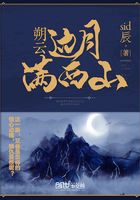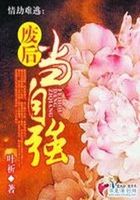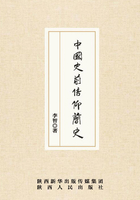Next, deliberately, and with many coughs, the ex-soldier set to work to collect some twigs and chips for the purpose of lighting a fire. After which, having arranged a kettle over the flames, he said to me suggestively:
"You too should collect some firewood, for in these parts the nights are dark and chilly."
I set forth in search of chips among the stones which lay around the barraque, and, in so doing, stumbled across the newcomer, who was lying with his body resting on an elbow, and his head on his hand, as he conned a manuscript spread out before him. As he raised his eyes to gaze vaguely, inquiringly into my face, I saw that one of his eyes was larger than the other.
Evidently he divined that he interested me, for he smiled. Yet so taken aback by this was I, that I passed on my way without speaking.
Meanwhile the carpenters, disposed in two circles around the barraque (a circle to each woman), partook of a silent supper.
Deeper and deeper grew the shadow of night over the defile.
Warmer and warmer, denser and denser, grew the air, until the twilight caused the slopes of the mountains to soften in outline, and the rocks to seem to swell and merge with the bluish-blackness which overhung the bed of the defile, and the superimposed heights to form a single apparent whole, and the scene in general to resolve itself into, become united into, one compact bulk.
Quietly then did tints hitherto red extinguish their tremulous glow--softly there flared up, dusted purple in the sunset's sheen, the peak of Kara Dagh. Vice versa, the foam of the rivulet now blushed to red, and, seemingly, assuaged its vehemence--flowed with a deeper, a more pensive, note; while similarly the forest hushed its voice, and appeared to stoop towards the water while emitting ever more powerful, intoxicating odours to mingle with the resinous, cloyingly sweet perfume of our wood fire.
The ex-soldier squatted down before the little blaze, and rearranged some fuel under the kettle.
"Where is the other man?" said he. "Go and fetch him."
I departed for the purpose, and, on my way, heard one of the carpenters in the neighbourhood of the barraque say in a thick, unctuous, sing-song voice.
"A great work is it indeed!"
Whereafter I heard the two women fall to drawling in low, hungry accents:
"With the flesh I'll conquer pain;
The spirit shall my lust restrain;
All-supreme the soul shall reign;
And carnal vices lure in vain."
True, the women pronounced their words distinctly enough; yet always they prolonged the final "u" sound of the stanza's first and third lines until, as the melody floated away into the darkness, and, as it were, sank to earth, it came to resemble the long-drawn howl of a wolf.
In answer to my invitation to come to supper, the newcomer sprang to his feet, folded up his manuscript, stuffed it into one of the pockets of his ragged coat, and said with a smile:
"I had just been going to resort to the carpenters, for they would have given us some bread, I suppose? Long is it since I tasted anything."
The same words he repeated on our approaching the ex-soldier; much as though he took a pleasure in their phraseology.
"You suppose that they would have given us bread?" echoed the ex-soldier as he unfastened his wallet. "Not they! No love is lost between them and ourselves."
"Whom do you mean by 'ourselves'?"
"Us here--you and myself--all Russian folk who may happen to be in these parts. From the way in which those fellows keep singing about palms, I should judge them to be sectarians of the sort called Mennonites."
"Or Molokans, rather?" the other man suggested as he seated himself in front of the fire.
"Yes, or Molokans. Molokans or Mennonites-- they're all one. It is a German faith and though such fellows love a Teuton, they do not exactly welcome US."
Upon this the man with the Cossack forelock took a slice of bread which the ex-soldier cut from a loaf, with an onion and a pinch of salt. Then, as he regarded us with a pair of good-humoured eyes, he said, balancing his food on the palms of his hands:
"There is a spot on the Sunzha, near here, where those fellows have a colony of their own. Yes, I myself have visited it. True, those fellows are hard enough, but at the same time to speak plainly, NO ONE in these parts has any regard for us since only too many of the sort of Russian folk who come here in search of work are not overly-desirable."
"Where do you yourself come from?" The ex-soldier's tone was severe.
"From Kursk, we might say."
"From Russia, then?"
"Yes, I suppose so. But I have no great opinion even of myself."
The ex-soldier glanced distrustfully at the newcomer. Then he remarked:
"What you say is cant, sheer Jesuitism. It is fellows like THOSE, rather, that ought to have a poor opinion of themselves."
To this the other made no reply--merely he put a piece of bread into his mouth. For a moment or two the ex-soldier eyed him frowningly. Then he continued:
"You seem to me to be a native of the Don country? "
"Yes, I have lived on the Don as well."
"And also served in the army?"
"No. I was an only son."
"Of a miestchanin? " [A member of the small commercial class.]
"No, of a merchant."
"And your name--?"
"Is Vasili."
The last reply came only after a pause, and reluctantly; wherefore, perceiving that the Kurskan had no particular desire to discuss his own affairs, the ex-soldier said no more on the subject, but lifted the kettle from the fire.
The Molokans also had kindled a blaze behind the corner of the barraque, and now its glow was licking the yellow boards of the structure until they seemed almost to be liquescent, to be about to dissolve and flow over the ground in a golden stream.
Presently, as their fervour increased, the carpenters, invisible amid the obscurity, fell to singing hymns--the basses intoning monotonously, " Sing, thou Holy Angel! " and voices of higher pitch responding, coldly and formally.
"Sing ye!
Sing glory unto Christ, thou Angel of Holiness!
Sing ye!
Our singing will we add unto Thine, Thou Angel of Holiness!"

